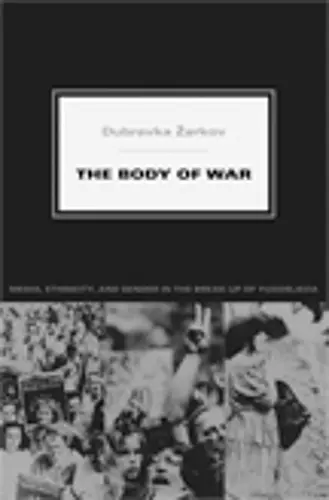The Body of War
Media, Ethnicity, and Gender in the Break-up of Yugoslavia
Format:Hardback
Publisher:Duke University Press
Published:3rd Sep '07
Currently unavailable, and unfortunately no date known when it will be back

Examines how notions of femininity and masculinity and heterosexual norms produced ethnicity in the disintegration of former Yugoslavia.
Analyses representations of female and male bodies in the Croatian and Serbian press in the late 1980s, and in early 1990s during the war in which Yugoslavia disintegrated. This book proposes that the Balkan war was not a war between ethnic groups; rather, ethnicity was produced by the war itself.In The Body of War, Dubravka Žarkov analyzes representations of female and male bodies in the Croatian and Serbian press in the late 1980s and in the early 1990s, during the war in which Yugoslavia disintegrated. Žarkov proposes that the Balkan war was not a war between ethnic groups; rather, ethnicity was produced by the war itself. Žarkov explores the process through which ethnicity was generated, showing how lived and symbolic female and male bodies became central to it. She does not posit a direct causal relationship between hate speech published in the press during the mid-1980s and the acts of violence in the war. Instead, she argues that both the representational practices of the “media war” and the violent practices of the “ethnic war” depended on specific, shared notions of femininity and masculinity, norms of (hetero)sexuality, and definitions of ethnicity.
Tracing the links between the war and press representations of ethnicity, gender, and sexuality, Žarkov examines the media’s coverage of two major protests by women who explicitly identified themselves as mothers, of sexual violence against women and men during the war, and of women as militants. She draws on contemporary feminist analyses of violence to scrutinize international and local feminist writings on the war in former Yugoslavia. Demonstrating that some of the same essentialist ideas of gender and sexuality used to produce and reinforce the significance of ethnic differences during the war often have been invoked by feminists, she points out the political and theoretical drawbacks to grounding feminist strategies against violence in ideas of female victimhood.
“Dubravka Žarkov’s remarkable book brings new insights to bear on the feminist theorizing of war. Nuanced, complex, lucid, and empirically grounded, Žarkov’s powerful combination of the insider’s understanding, passion, and emotional attachment with the academic’s distance and rigor, makes this a hard-to-put-down read.”—Urvashi Butalia, author of The Other Side of Silence: Voices from the Partition of India
“Theoretically sophisticated and passionately argued, The Body of War shows how women’s (and men’s) bodies are implicated in the war in former Yugoslavia and its aftermath. Dubravka Žarkov courageously goes where others have feared to tread, rejecting too-easy assumptions that this was just a conflict between ethnic groups. Her book is a ‘must read’ for anyone interested in the ways gender and sexuality intersect to produce differences in ethnicity, thereby creating the pretext and the context for conflict and war.”—Kathy Davis, author of The Making of Our Bodies, Ourselves: How Feminism Travels across Borders
“The Body of War is the crowning achievement of Dubravka Žarkov’s year-long research in media, gender and ethnicity during ethnic conflict in the former Yugoslavia. . . . The book is highly recommended to those interested not only in gender studies and issues of violence against women, but also to criminologists, victimologists, as well as scholars and activists in conflict, media and peace studies.” -- Vesna Nikolic-Ristanovic * Feminist Review *
“This illuminating book is erudite and systematic. There is a lot in it that is very valuable, particularly the discussion on victimized fe/male bodies, making this book an important addition to the literature on how gender and sexuality intersect with ethnicity and produce war and war violence in specific circumstances and points in time.” -- Maja Korac * Nations and Nationalism *
“While The Body of War provides an extremely useful feminist analysis for scholars and general readers on the discourses of the media during the Balkans conflict, it goes beyond discourse analysis to reflect upon, and intervene, in crucial current debates on feminist narrativization, historiography and practice. . . . Zarkov’s treatment of themedia, feminist discourse and questions of history and representation in the context of armed conflict provides a very thoughtful, accessible and timely platform towards this goal.” -- Neloufer de Mel * European Journal of Women's Studies *
ISBN: 9780822339557
Dimensions: unknown
Weight: 553g
296 pages